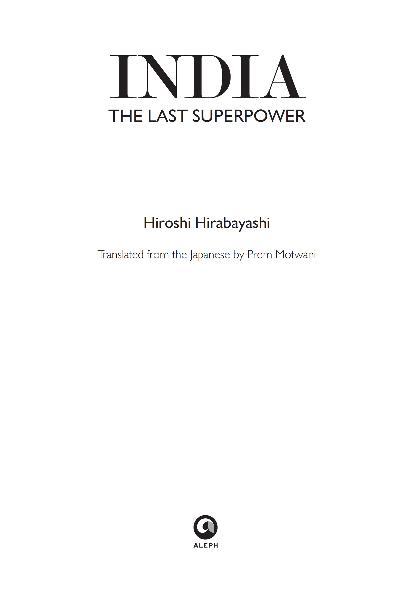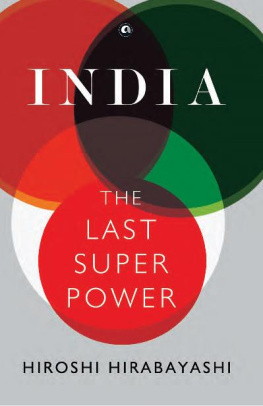ALEPH BOOK COMPANY
An independent publishing firm
promoted by Rupa Publications India
First published in India in 2021
by Aleph Book Company
7/16 Ansari Road, Daryaganj
New Delhi 110 002
Copyright Hiroshi Hirabayashi 2021
Translation copyright Prem Motwani 2021
All rights reserved.
The author has asserted his moral rights.
The views and opinions expressed in this book are those of the author and the facts are as reported by him, which have been verified to the extent possible, and the publisher is not in any way liable for the same.
The publisher has used its best endeavours to ensure that URLs for external websites referred to in this book are correct and active at the time of going to press. However, the publisher has no responsibility for the websites and can make no guarantee that a site will remain live or that the content is or will remain appropriate.
No part of this publication may be reproduced, transmitted, or stored in a retrieval system, in any form or by any means, without permission in writing from Aleph Book Company.
ISBN: 978-93-90652-34-1
This book is sold subject to the condition that it shall not, by way of trade or otherwise, be lent, resold, hired out, or otherwise circulated without the publishers prior consent in any form of binding or cover other than that in which it is published.
PROLOGUE
India has emerged as a major power in Asia along with China in recent times. In the near future, India is projected to attain the status of the fourth global superpower to join the ranks of the United States of America, Russia, and China. No other country is expected to attain this status in the foreseeable future. Thus, India will remain the last superpower for many generations.
India will overtake China in 2025 in terms of population
Indias global profile is already gaining significance. Its importance in political, economic, cultural, and religious spheres has been steadily gaining ground. India has built cordial relations with the advanced nations of the West, including former colonial power, the United Kingdom, and communist Russia. In the last several decades, it has strived hard to strengthen relations with the United States of America and East Asia as the AsiaPacific region has become the fulcrum of geopolitics in recent years.
At present, Indias population stands at around 1.38 billion and is already the second largest in the world after China. It is expected to overtake China by the year 2025. At a time when several developed countries are experiencing serious demographic challenges with the increase of the elderly population, India enjoys a demographic advantage with a large young population leading to a healthy pyramid structure. In the education sector, India has also made considerable strides. By registering consistent high economic growth for some years, it now leads the group of emerging countries in the world.
India has risen to the rank of leading nations in the global comity of nations. India has the largest diaspora population in the world with around 13 million Indians living outside the country who have, in turn, contributed to Indias global standing in considerable measure. As a result, Indias influence on the international society has become noticeable.
Domestic reforms in India
The churning of Indias domestic politics is quite rapid. The government of Prime Minister Narendra Modi is based on a strong foundation. This has enabled the government to put reforms on fast track.
With the aim to tackle black money in India, Prime Minister Modi unleashed a dramatic measure on 8 November 2016 to invalidate currency notes of two denominations500 (about 800) and 1,000 (about 1,600) from midnight of the same day. This demonetization announcement took Indians and the whole world by surprise.
These two currency notes were of high denominations in India. These notes needed to be exchanged with the new 500 and 2,000 notes that were to be issued later. A period of some days were announced during which people could deposit the old notes in the banks and maintain the notes as legal tender, failing which such notes would be rendered useless.
There were two objectives behind this drastic measure. One was to make an attempt to curb the circulation of illegal money, corruption, and tender funding and the other was to counter the threat to the Indian law and order situation by the counterfeit currency used by terrorists.
The sudden decision to demonetize by the Modi government created panic in the whole country. There was a frenzied rush of people at banks and ATMs in an effort to withdraw cash. People overnight turned to payment gateways using credit cards. Corrupt businessmen, politicians, and bureaucrats were mere spectators as huge amounts of ill-gotten cash hoarded by them turned into mere pieces of waste paper. The ordinary citizens too faced severe hardships as the cash-based economy took a severe beating. But the move eventually worked wonders.
As a result, there was hardly any negative impact on the Indian economy. The Indian stock market (Sensex) remained unaffected and, in fact, surged sharply later.
In March 2017, state assembly elections were held in Uttar Pradesh (UP), the largest state in India. The Bharatiya Janata Party (BJP) registered a sweeping victory winning three-fourths of the seats. The inability of the regional parties to use black money for the elections also had its impact on the poll outcome. In other words, Modis monetary policy seemed to have been endorsed by the people which encouraged Modi to further accelerate his economic reforms drive.
Indias importance for Japan
India is an extremely important country for Japan. There are a variety of reasons for it, but the main ones are as follows:
- India is a leading pro-Japan country.
- India is the largest democracy in the world and its basic values are commonly shared with Japan.
- India is a leader amongst the developing nations and at the same time has extremely good relations with America, Japans ally.
- India is an important country for Japan, geopolitically as well as strategically.
- Indias has huge economic potential and it is becoming increasingly important for the Japanese economy.
The Indian people place respect and faith in the Japanese people. The Indian government and Indian companies hold Japan in awe. Indians recognize Japan as a brother country connected with spiritual bonds of Buddhism and basic values of democracy and freedom. As for the economy, India looks up to Japan as a mentor.
Pro-Japan India
What is the source of Indias traditional pro-Japanese stance? I shall discuss about it in detail in , but let me briefly touch upon it here.
First of all, the bond of Buddhism is the foundation in this regard. Japan and India have historical and spiritual bonds based on Buddhism. Four heavenly kings or the eight legions such as Tathagata and Bodhisattva were originally Hindu divinities transmitted from India to Japan. This is evident if one visits Kofukuji National Treasure Hall in Nara or Toji and Sanjusangendo in Kyoto. Buddhist idols are displayed together with idols revered by Hindus in these famous Buddhist temples.
The biggest thing that Indians are grateful to Japan for is the latters support and contribution towards Indias independence movement.













